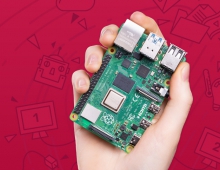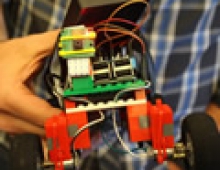
PiPhone - A Home-made Raspberry Pi Smartphone
Dave Hunt, an embedded Linux software engineer working with Irish company Emutex Ltd., has come with a home-made smartphone based around a Raspberry Pi.
The small device includes a parts list coming in at only $158. The PiPhone is built entirely from off-the-shelf kit, so there's no soldering required, and no fiddly electronics work.
It features a Sim900 GSM/GPRS module talking to the network; an on/off switch, a converter to make the LiPoly battery output 5 volts, and one of Adafruits tiny TFT monitors. You'll find a thorough writeup on Dave's website, with a parts list, although he hasn't uploaded the code, which he currently considers a bit hacky, to GitHub yet.

The Raspberry Pi is based on a BCM2835 System on a Chip (SoC), which was originally developed to do lots of media acceleration for mobile phones. Mobile phone media systems tend to follow behind desktop systems, but are far more energy efficient. You can see this efficiency at work in your Raspberry Pi: to decode H264 video on a standard Intel desktop processor requires GHz of processing capability, and many (30-40) Watts of power; whereas the BCM2835 on your Raspberry Pi can decode full 1080p30 video at a clock rate of 250MHz, and only burn 200mW.
It features a Sim900 GSM/GPRS module talking to the network; an on/off switch, a converter to make the LiPoly battery output 5 volts, and one of Adafruits tiny TFT monitors. You'll find a thorough writeup on Dave's website, with a parts list, although he hasn't uploaded the code, which he currently considers a bit hacky, to GitHub yet.

The Raspberry Pi is based on a BCM2835 System on a Chip (SoC), which was originally developed to do lots of media acceleration for mobile phones. Mobile phone media systems tend to follow behind desktop systems, but are far more energy efficient. You can see this efficiency at work in your Raspberry Pi: to decode H264 video on a standard Intel desktop processor requires GHz of processing capability, and many (30-40) Watts of power; whereas the BCM2835 on your Raspberry Pi can decode full 1080p30 video at a clock rate of 250MHz, and only burn 200mW.




















